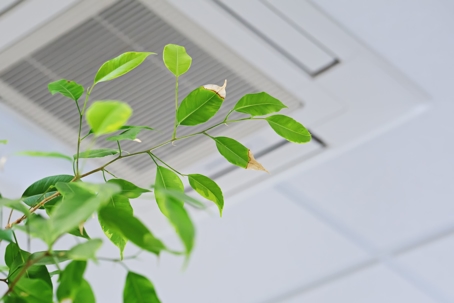Air scrubbers are small devices that sanitize the air as it runs through your HVAC system. They are becoming more popular as people look for ways to improve their indoor air quality and make it safer and healthier. The safety of our homeandrsquo;s air has become a particular concern in the wake of the COVID-19 pandemic. As we have all become more aware of airborne viruses and other contaminants, air scrubbers offer a simple solution to this problem.
How Do Air Scrubbers Work?
Unlike simple air filters, air scrubbers can neutralize and eliminate microbes in your air. They accomplish this using shortwave UV light (also called UV-C or UVC light). When air flows by the scrubber, the light from the scrubber eliminates any contaminants. Ultraviolet light affects the DNA of germs and viruses, rendering them unable to reproduce.
Air scrubbers are also capable of removing small particles and allergens from the air with negatively charged ions. As the air then continues to circulate throughout your home, the air scrubber continues to clean your air and within a few cycles, your homeandrsquo;s air is significantly cleaner. With continuous cycling, air scrubbers can help maintain cleaner air in your home.
Because air scrubbers are nearly 100% effective, they are growing in popularity. They are one of the most common products purchased by homeowners looking to improve their homeandrsquo;s air quality.
What Can Air Scrubbers Remove from the Air?
Your HVAC system comes with a basic, built-in filter. This filter does a lot of work to remove dust and larger particles from the air. However, they are not capable of filtering out smaller particles or microbes. This is where the air scrubber comes in. Generally speaking, microorganisms cannot survive under concentrated doses of UV light. With the use of UV light, air scrubbers can effectively kill off a majority of microbes.
Air scrubbers can help eliminate the following from your homeandrsquo;s air:
- Allergens
- Bacteria
- Dust mites
- Mold spores
- Pollen
- Viruses
Air Scrubbers Versus Germicidal UV Lights
Both air scrubbers and germicidal UV lights utilize similar technology. However, germicidal UV lights are focused on one specific task, neutralizing microbes. Air scrubbers are popular in part because of how much they can do compared to more targeted systems like germicidal UV lights. Air scrubbers provide more comprehensive air cleaning services, including removing other contaminants like allergens and dust. Instead of installing several individual systems, you can install an air scrubber to take care of a wide range of air quality needs.
Can Air Scrubbers Kill the COVID-19 Virus?
According to the FDA, UVC radiation may be effective in neutralizing the COVID-19 virus. However, it is important to remember that your air scrubber will only eliminate contaminants already existing in your home. For them to kill the COVID-19 virus, the virus must have been brought into your home. Air scrubbers are not a replacement for CDC-recommended COVID-19 prevention methods like wearing, facemasks. frequent hand washing and social distancing.
It is also very important that you have your air scrubber installed by a professional because air scrubbers utilize intense UV light, improper installation can cause injuries such as burns and eye injuries. We are here to help!
Whatandrsquo;s Happening at Valley in April
This month on the blog, we look forward to the warmer weather on the horizon. This time of year, many home and small business owners are looking to brush out the cobwebs. As you start tackling those home improvement projects, donandrsquo;t forget to add air duct cleaning to your checklist! Spring is the perfect time to clean your air ducts as it helps get your system ready for the summer and can even reduce your allergy symptoms!
We also dig into the complicated world of Solar Renewable Energy Credits (SRECs). Renewable energy credits (RECs) are certificates that are earned for produced renewable energy. Some states have solar “carve-outandrdquo; programs that allow people to earn SRECs. In states where REC or SREC markets exist, those credits can then be sold to utility providers to help them meet their stateandrsquo;s renewable portfolio standards (RPS) regulations. In some states, a single SREC can be sold for hundreds of dollars. To learn more about the world of RECs, check out our blog.
